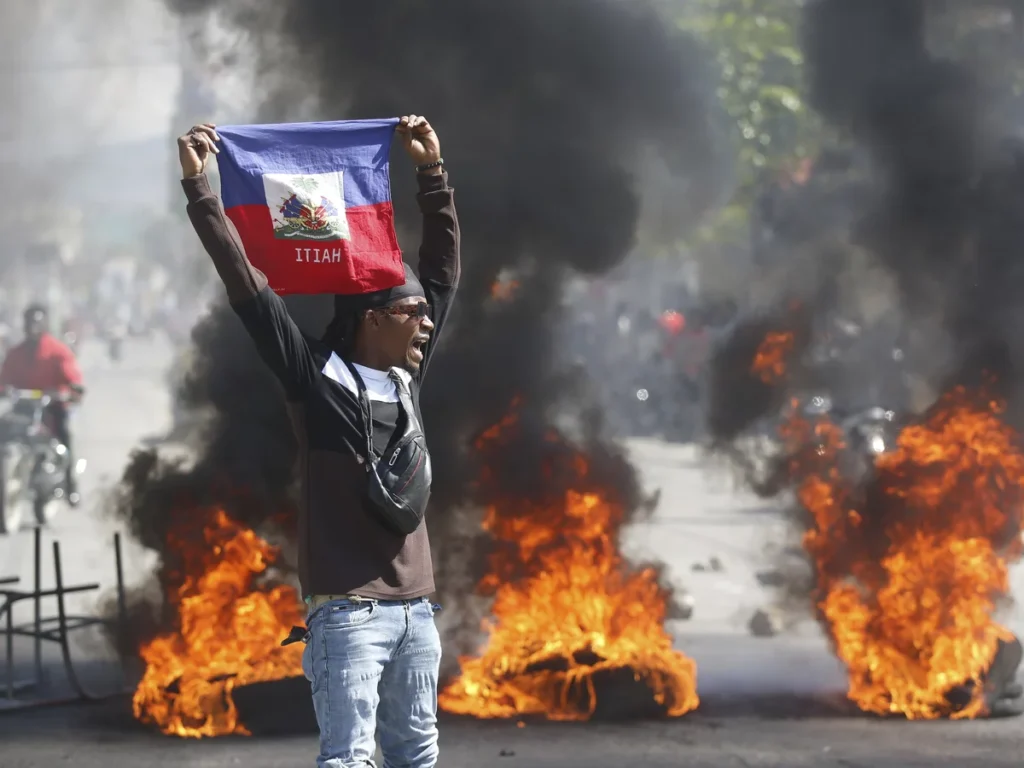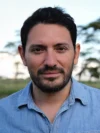3 Things to Know about the Current Crisis in Haiti
LATIN AMERICA AND THE CARIBBEAN, 11 Mar 2024
Eyder Peralta | NPR - TRANSCEND Media Service

A demonstrator holds up a Haitian flag during protests demanding the resignation of Prime Minister Ariel Henry in Port-au-Prince, Haiti, on Friday, 1 Mar 2024. Odelyn Joseph/AP
6 Mar 2024 – Haiti is entering its second day of a state of emergency, after gangs attacked the capital city’s most important prisons over the weekend, releasing thousands of inmates. The country’s airport is under siege, and on Monday evening, it was still not clear whether Haiti’s de facto prime minister had made it back into the country.
Monique Clesca, a well-known activist in Haiti, says the weekend represented “three days of terror.”
“Gangs paraded throughout Port-au-Prince with their arms openly,” she told NPR. “It wasn’t done at night and the police was nowhere to be found.”
Almost three years after the assassination of President Jovenel Moïse, Haiti has been in free-fall. Elections haven’t been held since 2017, so the term for every elected official has expired; security services are overwhelmed and millions are going hungry.
Here are three things you should know about this latest bout of violence in the country:
It marks the overt involvement of gangs in politics
Robert Fatton, who studies Haiti at the University of Virginia, says other bouts of violence in Haiti were marked by fights between gangs.
This time, he says, the gangs in Haiti have forged an alliance and at least one of the big gang leaders, Jimmy Chérizier, who is nicknamed Barbecue, has said explicitly that the point of this violence is to overthrow the government.

Leader of the “G9 and Family” gang, Jimmy Cherizier, better known as Barbecue, in Haiti on Oct. 21, 2022. Matias Delacroix/AP
Fatton says working together, the gangs have flexed a powerful muscle. They already controlled most of the capital city, but over the past week, they shot at airplanes at the international airport in Port-au-Prince. International airlines stopped their flights, something that rarely happened in the past. The gangs also overpowered police at two of the main prisons and managed to release thousands of inmates.
This is a critical moment for Haiti, Fatton says.
“The situation is on the verge of a real collapse of any and every institution that remains in the country,” he says.
In other words, he says, there is a possibility the gangs could become the dominant force in Haiti.
Haiti’s de facto prime minister is not in the country
Haiti’s de facto Prime Minister Ariel Henry traveled to Kenya last week. Last year, the East African country agreed to lead a multinational force in Haiti, but Kenyan courts have delayed the deployment. Henry was in the country trying to close that deal.
When the violence broke out, it was Patrick Boisvert, the country’s finance minister who was acting as prime minister, who signed the emergency declaration.

Haiti’s Prime Minister Ariel Henry gives a public lecture at the United States International University in Nairobi, Kenya, on Friday. Henry said elections in his country need to be held as soon as possible to bring stability to the troubled Caribbean nation. Andrew Kasuku/AP
At a press briefing, the U.S. State Department said Henry was “returning to the country.”
“We think it’s important that he do so and that he be allowed to do so,” State Department spokesperson Matthew Miller said, declining to say more.
On Tuesday night, however, several news outlets were reporting that Henry had touched down in Puerto Rico. Citing tracking data, The Associated Press reported that Henry’s flight had originated in New Jersey and was heading toward Dominican Republic, which shares with Haiti the island of Hispaniola. His plane circled mid-flight before diverting to Puerto Rico.
Kenyan police are still seen as the way out of this crisis
Speaking to reporters the State Department’s Miller said the crisis “underscores the urgency” of finalizing the Kenyan-led mission.
Clesca, who was part of a civil society group that has promoted a holistic approach to ending the Haitian crisis, says part of the problem is that Prime Minister Henry has been solely focused on a military solution. Henry, she says, could have ordered a state of emergency from the time he came to power, allowing the police to bring the gangs under control and at the same time plan for elections.
“Instead, a few months after [he came to power], he went to the United Nations and said ‘send me some troops’ and then crossed his arms,” Clesca says. “And that’s all they did — wait and wait and wait.”
On Friday, Henry and Kenyan President William Ruto witnessed the signing of a bilateral agreement authorizing the deployment of 1,000 Kenyan police officers to Haiti. Kenya’s government believes the agreement satisfies the objections of the Kenyan courts, which had stopped the deployment.
“It is a mission for humanity,” Ruto said. “It is a mission in solidarity with our brothers and sisters in Haiti.”
Ruto said the signing of the agreement was the “final step” and that his police force would “be there at the earliest opportunity that is possible.”
_____________________________________________________
Correction March 5, 2024: This story was updated to reflect Haiti’s de facto Prime Minister Ariel Henry arriving in Puerto Rico.
 Eyder Peralta is an international Mexico City correspondent since 2022. Peralta has reported from more than 20 countries on four continents. In 2022, his coverage of East Africa was named a finalist for the Pulitzer Prize in the Audio Reporting category. He joined NPR as associate producer, working his way up to become an international correspondent in 2016.
Eyder Peralta is an international Mexico City correspondent since 2022. Peralta has reported from more than 20 countries on four continents. In 2022, his coverage of East Africa was named a finalist for the Pulitzer Prize in the Audio Reporting category. He joined NPR as associate producer, working his way up to become an international correspondent in 2016.
Tags: Central America, Haiti, Latin America Caribbean
DISCLAIMER: The statements, views and opinions expressed in pieces republished here are solely those of the authors and do not necessarily represent those of TMS. In accordance with title 17 U.S.C. section 107, this material is distributed without profit to those who have expressed a prior interest in receiving the included information for research and educational purposes. TMS has no affiliation whatsoever with the originator of this article nor is TMS endorsed or sponsored by the originator. “GO TO ORIGINAL” links are provided as a convenience to our readers and allow for verification of authenticity. However, as originating pages are often updated by their originating host sites, the versions posted may not match the versions our readers view when clicking the “GO TO ORIGINAL” links. This site contains copyrighted material the use of which has not always been specifically authorized by the copyright owner. We are making such material available in our efforts to advance understanding of environmental, political, human rights, economic, democracy, scientific, and social justice issues, etc. We believe this constitutes a ‘fair use’ of any such copyrighted material as provided for in section 107 of the US Copyright Law. In accordance with Title 17 U.S.C. Section 107, the material on this site is distributed without profit to those who have expressed a prior interest in receiving the included information for research and educational purposes. For more information go to: http://www.law.cornell.edu/uscode/17/107.shtml. If you wish to use copyrighted material from this site for purposes of your own that go beyond ‘fair use’, you must obtain permission from the copyright owner.
Read more
Click here to go to the current weekly digest or pick another article:
LATIN AMERICA AND THE CARIBBEAN:

